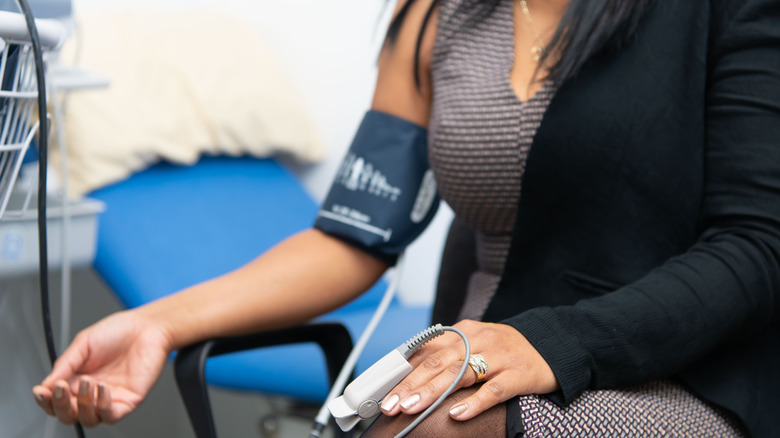When Is Low Blood Pressure Considered Too Low?
It's important to keep up with routine blood pressure screenings, as early intervention is one of the best ways to detect and treat any potential health conditions before they worsen, states the U.S. Centers for Disease Control and Prevention (CDC). Through the use of an inflatable cuff, your physician or pharmacist will take your blood pressure by tightening the cuff around your arm before progressively releasing the air. As the cuff deflates, the reading on the cuff's gauge, as well as the pace of your pulse, will inform your healthcare provider of your blood pressure measurements.
Having consistently high blood pressure can eventually lead to heart failure, kidney failure, and stroke, according to experts at the Cleveland Clinic. But what about blood pressure readings that are too low? What are the symptoms to look out for, and where is the line drawn between a healthy blood pressure measurement and one that has dropped far below normal?
Experts at Premier Health define blood pressure as "the force of blood pushing on the artery walls as it is pumped out of the heart." Blood pressure readings consist of two measurements: systolic pressure and diastolic pressure. Systolic pressure — the first number — measures heart activity, while diastolic pressure — the second number — measures inactivity between heartbeats.
Sudden drops in blood pressure can be cause for concern
According to Premier Health, a healthy blood pressure reading sits below 120/80 mmHg. However, blood pressure that measures less than 90/60 mmHg is considered abnormally low. Low blood pressure is not always cause for concern. For instance, it's not uncommon to experience low blood pressure during the first and second trimesters of pregnancy. Additionally, blood pressure may drop in response to extended periods of bed rest, certain medications, or from standing up too quickly.
In other cases, low blood pressure could be a symptom of a more serious health condition such as hypothyroidism, diabetes, septic shock, anaphylaxis, or a vitamin deficiency, according to the American Heart Association (AHA). Experts at the Mayo Clinic explain that even seemingly minor drops in blood pressure can be hazardous if they occur suddenly, leading to dizziness, fainting, and possible falls. Significant drops in blood pressure, particularly if due to excessive bleeding, can be fatal.
Per the American Heart Association (AHA), in addition to low blood pressure readings, if you experience accompanying symptoms such as dizziness, clammy skin, fainting, nausea, dehydration, or blurred vision, amongst others, be sure to discuss it with your doctor or seek prompt medical attention.


